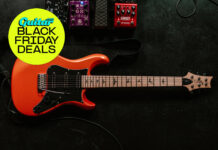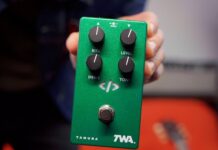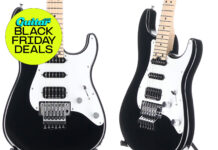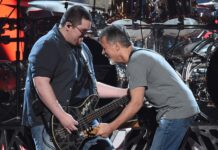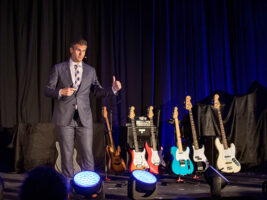
“The electric guitar is an American cultural export” NAMM CEO John Mlynczak on why Fender, Gibson, PRS and others joined forces to lobby congress over wood tariffs
Since President Donald Trump took office for the second time in January, his administration has used executive orders to enact sweeping changes to the way the USA trades with the rest of the world – most notably by using hefty tariffs on the import of goods into the United States from countries around the world.
While the impact of these tariffs has been felt across the American economy, the guitar industry seems to be especially keenly impacted.
READ MORE: “There is no magical increase in sales from patriotic Americans willing to rescue us” – how Trump’s tariffs are stretching US amp and pedal companies to breaking point
Over the last few weeks on Guitar.com we’ve been covering the devastating impact these new tariffs have had on America’s thriving boutique effects industry. Dozens of makers told us how their businesses were teetering on the brink of collapse as a result, and explained why the long-term goals of bringing certain industries to America from China and elsewhere would come too late to save them.
But what about the guitars themselves? On the surface US-made guitars are less keenly impacted by the tariffs on electronic components from places like China, but what about wood? The awkward reality is that a huge amount of the tonewoods that are used in the construction of US-made guitars come from outside of the US.
That’s a significant problem for the American guitar industry as a whole, and it’s led NAMM CEO John Mlynczak to spur his organisation into action. Mlynczak has spoken out several times about the threat these tariffs pose to the industry and called for musical instruments to be exempted from tariffs, but he’s also been working behind the scenes.
Back in May, Mlynczak and NAMM went with a delegation of key figures from the US guitar industry – representatives from Fender, Gibson, PRS, Martin and Taylor – to Washington DC. The aim was meet with congressional representatives and try to help them understand the situation.
John Mlynczak. Image: Press
It was an unusual and striking move to see the biggest players in the American guitar industry move as one, so now that the dust has settled, we caught up with Mlynczak to find out why he felt the mission was an important one.
“We talk so much about the NAMM show, but we are first and foremost, an association [NAMM is an abbreviation of National Association of Music Merchants – Ed],” Mlynczak explains. “And so that was a big thing we got from talking to members – what can we do for you year round?
“We have amazing companies, we have innovators, we have incredibly resilient people in our industry that are out there fighting the good fight every day. But what is it that only the Association can do? Particularly in DC, only the Association, in partnership with members, can go lobby.”
Mlynczak describes the tariff situation as “scary and unfortunate” for the guitar industry, but it was also a chance for NAMM to provide leadership, organisation and direction – and to show its members that it is going to bat for the US music industry at the highest level.
“We can now show our industry that we’re not just the big trade show of the past,” he explains, animatedly. “We’re out there.”
John Mlynczak and Jon Batiste at The 2025 NAMM Show at Anaheim Convention Center on January 24, 2025 in Anaheim, California. Image: Daniel Knighton/Getty Images
Story Tellers
You might well ask what an organisation like NAMM, or indeed the brands associated with the delegation can really do to impact US government policy given the comparatively small size of the guitar industry in relation to something like consumer electronics or the garment industry.
But Mlynczak believes that there’s power in putting human faces and real-world testimonials into the hands of lawmakers.
“Members of Congress, we hear it time and time again – they desperately need stories when they go debate in committees and they go debate on the floor,” he affirms. “If you ever watch C-Span – and I was a C-Span junkie for a while – they’re focusing on stories from their district.
“That’s what they’ve told us, ‘We need stories from our district. How do I make the case to the other side or to my committee?’ So when we bring members and we’re arming them with data. It’s super necessary work.”
Regarding the specific issue of tariffs on tonewoods, Mlynczak clearly believes that the proactive stance that NAMM and its members took in DC was the best route.
“The tariffs are incredibly nuanced and complicated,” he admits. “But there are various Section 232 investigations [an investigation by the Department of Commerce on the impact of certain imports on national security – Ed] on various industries happening right now.
“One of them is on imports of timber. And so the high level ask that we wanted to work on, was making sure that we submitted letters to congress, and we submitted investigation letters through the process.
“But we also met with high-level members of Congress just to follow up and say, ‘Hey, we’ve done this… and by the way, American made brands can’t make these products unless they get wood from overseas. We don’t grow these species of wood in the United States!’”
Time will tell how effective this lobbying effort was on US government policy, but Mlynczak feels like there’s a clear and obvious case for the exemptions he’s previously called for.
“Our industry does have American manufacturing,” he insists. “I mean, you think about it, what’s more iconically American, what’s more apple pie… than the electric guitar? Man, come on, there’s nothing more American than that!
“The electric guitar – that is an American cultural export. And so if we were going to fight for anything in this climate of prioritising American manufacturing, that was the one.”
The post “The electric guitar is an American cultural export” NAMM CEO John Mlynczak on why Fender, Gibson, PRS and others joined forces to lobby congress over wood tariffs appeared first on Guitar.com | All Things Guitar.
Source: www.guitar-bass.net

